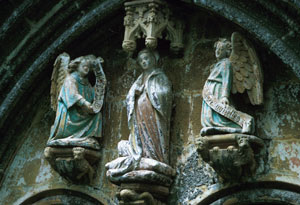How One Woman Stopped Living in Fear—and Learned to Live Through Faith

Photo: Thinkstock
Faith—along with plenty of perseverance—took Christine Lincoln from the pits of addiction to the top of her college class, a major literary award and the endless possibilities of her life.
Hers is a life that flies in the face of logic. At 34, Christine Lincoln has just graduated from college with a perfect 4.0—the highest grade point average a student can earn—but years earlier, she had all but failed high school. She is a single mother raising her 7-year-old son, who was born despite a doctor's prediction that Lincoln would never have children. And she is an award-winning fiction writer whose stories chronicle the struggles of young black children—though for years it looked as if her own struggles would kill her.
Lincoln was only 4 when a family friend began sexually abusing her. "I would mentally take myself out of my skin," she says of the molestation that continued until she was 7. As a teenager, she sought refuge in drugs and alcohol—anything to shield her from reality. And for nearly two decades, she was lost in an abyss of addiction and depression.
But eventually, Lincoln's propensity for fantasy and escape led her to write short stories. Soon she was creating characters through whom she could at last reveal herself: Pontella, who feels she is not seen; Wheat, who is in so much pain she says that even her skin hurts. During her senior year at Maryland's Washington College, Lincoln completed a collection of these stories. The collection won her the school's annual Sophie Kerr Prize, named after a 1930s fiction writer and presented to the graduate deemed to have the most literary promise. It came with a $54,000 endowment. Her writing also caught the eye of a well-known New York literary agent who represents such acclaimed authors as Susan Sontag and Jamaica Kincaid and who plans to sell Lincoln's collection, Sap Rising. "The truth is, I should be dead," Lincoln says. "I am living proof that it is never too late to save yourself."
Growing up in a middle-class Baltimore neighborhood, Lincoln and her two younger brothers were raised by her mother, Sharon, an accountant, and her father, George, an information systems manager. Her family gathered on Sundays, alternating between the homes of Lincoln's two grandmothers, for lavish meals and long conversations that stretched into the twilight. Lincoln often sat cross-legged on the floor, listening to her father's mother tell folktales and family legends.
At her other grandmother's home, Lincoln met her abuser, her uncle's best friend. She remembers him taking her into a bathroom, sitting her on his lap, and stroking her thighs with his callused hands. Though as many as 20 people were gathered at the house, no one, it seems, noticed the young girl's absences. "I began to think, Is this actually happening?" she says. "I started to feel invisible."
To make herself seen, Lincoln became a model student at school. She earned good grades, stayed after class to clean chalkboards and, in fourth grade, daydreamed that her teacher, Mrs. Kearney, would adopt her. Once, as part of a writing assignment, she handed in a story about a haunted house that had human qualities. Impressed, Mrs. Kearney knelt down beside Lincoln's desk and said, "Chris, you're a writer."
Lincoln was also an avid reader. Maya Angelou's I Know Why the Caged Bird Sings, an autobiographical account revealing sexual abuse by the boyfriend of Angelou's mother, made a deep impression on her. "It told me that another person had gone through what I was going through," she says. "I wasn't alone."
Still, Lincoln was so distraught that by the time she reached adolescence she had tried to kill herself twice. In both cases she overdosed with prescription pills and hid the attempt from her family by pretending it was an accident. "I didn't know what I was doing," she says. "I was tired and I just wanted to sleep."
Her mother, now 50, says she hadn't known how to decipher her daughter's messages. "I thought I knew what was happening with my daughter," Sharon Lincoln says. "But I was so wrong."
Her mother also didn't realize that Lincoln had begun using drugs at 13. "When I was high, I felt I could do anything. I was confident and strong." And at 16 she was pregnant, by a 20-year-old who lived down the block. "I decided to keep the baby. I thought it was the mark of true womanhood," she recalls. "But by the sixth month of my pregnancy, I started having second thoughts." She had a late abortion, an excruciating experience that left her scarred both physically and emotionally. "I was told it was a boy. I remember the nurse holding him and turning around quickly so I wouldn't see," Lincoln says. "But I did. And I'll never forget that image."
Weeks later, the teenager developed a serious infection, and the doctor told her she'd probably never be able to have children. Her mother stood by, horrified by everything. "Of course, I was devastated. When I found out Christine was pregnant, I couldn't believe it," Sharon Lincoln says. "This wasn't supposed to happen to my daughter."
Vowing to change her life, Lincoln entered the Air Force when she was 18. For the next two years, while she trained to be an X-ray technician, she stayed off drugs and alcohol. Then she got engaged to a decorated military man. As the wedding approached, however, she had a nagging feeling something was wrong. She considered backing out, but the idea overwhelmed her. "The invitations had been sent out," she says. "Everything had already been paid for. I couldn't cancel."
Next: "After years of silencing pain with drugs, I had finally found a voice"



